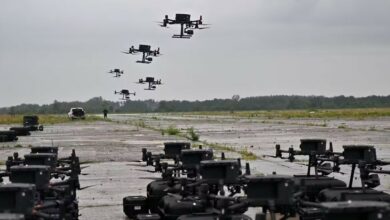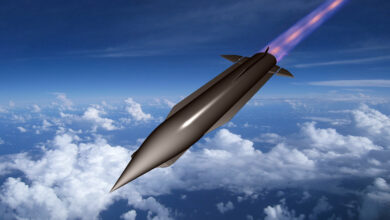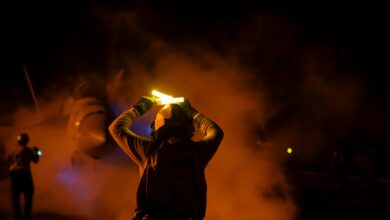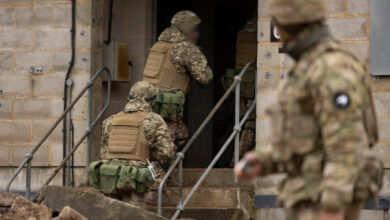
The words “Civil Defence” conjure up for most Britons a rather quaint image — that of middle-aged men and women in blue boiler suits and tin hats, standing ready beside air raid sirens and Anderson shelters.
Such an image doesn’t seem to fit well with today’s mod-cons, and that was what the British government concluded in 1968 when it abolished the Civil Defence Corps after deciding that since few people would survive the nuclear holocaust, there was no point in spending money on civil defense.
COVID-19 and British Homeland Resilience
Fast forward nearly 50 years, and we are still feeling the ill effects of that myopia. An article written for King’s College London in 2020 underlined how COVID-19 had exposed a fundamental weakness in British homeland resilience.
Faced with overwhelming pressure on the public healthcare system NHS, the British government was forced to draft in large numbers of troops to conduct vaccination drives and even drive ambulances.

Readers with military experience will know that this is not what armed forces are meant to do. Diverting troops to assist in civil works disrupts training, damages cohesion by splitting up units, and limits the options available to commanders and policymakers in the event of a sudden crisis abroad.
Some might argue that the pandemic was a once-off event that will not be repeated.
The problem with this thinking is that using troops for disaster relief has become a fixture of British policy. Soldiers have been used for flood relief for decades now, the most recent example being Storm Dennis in 2020 when 200 troops were called up to aid.
Sudden Crisis
The implications for the British government, should it be faced with a sudden crisis at home at the same time as having to deploy the bulk of the armed forces abroad, are alarming.
The pandemic has already exposed just how badly undermanned the NHS truly is. The fire, police, and NHS services all have their own auxiliary branches, but these branches have been shown to be pitifully undermanned and underfunded, and badly hampered by the lack of a central coordinating organization.
The Royal Voluntary Service, the sole survivor from the WWII-era of civil defense, is a youth charity rather than a uniformed emergency service and has none of the necessary training or organizational framework to perform as an ad-hoc civil defense force.
Faced with a major land war, the British government would not be able to fall back on the armed forces if a crisis at home emerged. It would have no option but to muddle on through as best as it can, recalling retired doctors and police officers to make up the shortfall and hastily drafting a volunteer organization to help out — one that, due to lack of a pre-established structure or cadre of instructors, would be rife with teething problems.
Casualties amongst the civilian population would be severe, and it is likely that any government that presided over this debacle would be brought down — and rightly so.
Civil Defense Forces
It is precisely such crises that a civil defense force exists for, and that is why most Western democracies have them.
Germany, Ireland, Denmark, France, Italy, Spain, Poland, and Romania all have civil defense forces on a large scale, composed either of volunteers or of redirected conscripts.
There is no fundamental reason, other than parsimony and lack of public awareness, why Britain cannot do the same. The Special Constabulary and volunteer fire and NHS services would also have to be expanded, and their training greatly increased.
As for the armed forces themselves, the manpower shortages they will face make it imperative that the Home Service Force is reestablished.

This would be composed of former service personnel, cadet instructors and master cadets, and Ministry of Defence police officers, all of whom possessed a certain standard of experience and basic fitness, but for whom work, health, family, or age prevented enlistment in a frontline unit.
These part-time troops could be brought to operational readiness very quickly and would be tasked with guarding installations against sabotage or terrorist assaults, much as the original force did during the Cold War period.
Parallel with this, it is essential that the British government form a centralized “Home Defence Command” with control over all police, fire, and health services, extended in emergency to private, youth, and charitable organizations such as St John’s Ambulance, the First Aid Nursing Yeomanry, and the over-16 elements of the Cadet Forces.
This “HDC” would have permanent staff and would be tasked with coordinating the response between these organizations in the advent of a large-scale crisis.
Rectifying Shortfalls in Home Defense
This is not to say that we need to start building barricades outside our ports or building air-raid shelters. But we cannot exclude the possibility of Vladimir Putin lashing out with weapons against which barricades are of little use.
A vial of Novichok, liberally dispersed at Felixstowe or Southampton docks, would render them unusable for weeks at a time — chemical decontamination is a slow and laborious process.
This is not to mention the horrific deaths and injuries that would be inflicted or the hysteria that would follow due to the crippling of our food import capabilities.
It is precisely for such a scenario that a Civil Defence Corps would be of vital assistance. Civil Defence personnel could fight fires, assist in decontamination, supervise evacuations, and provide first aid.
Medical volunteers could relieve overstretched ambulance and emergency ward personnel. An expanded Special Constabulary could free up professional constables for public order and protection duties, while a resurrected Home Service Force would allow the armed forces to deploy to the battlefront in greater strength.
For the sake of British national security, it is imperative that the shortfalls in home defense be rectified.
Those in power who disagree risk the wrath of a grief-struck nation, an exasperated parliament, and a military that finds itself without options for expansion in a world where high-intensity conflict looks set to stay.
 William Morris is a Master’s student in War Studies at King’s College London, and specializes in the problems facing British home defense organizations from the 18th century onwards, from the Volunteer Corps through to the Home Service Force of the 1980s.
William Morris is a Master’s student in War Studies at King’s College London, and specializes in the problems facing British home defense organizations from the 18th century onwards, from the Volunteer Corps through to the Home Service Force of the 1980s.
His current dissertation thesis will compare British anti-invasion preparations in 1940 with German preparations for Operation Sea Lion, with the aim of demonstrating that the latter was inherently operationally unsound in 1940.
The views and opinions expressed here are those of the author and do not necessarily reflect the editorial position of The Defense Post.
The Defense Post aims to publish a wide range of high-quality opinion and analysis from a diverse array of people – do you want to send us yours? Click here to submit an op-ed.











